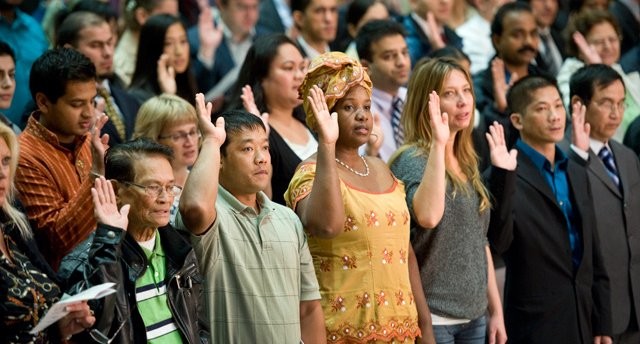
A tremendous amount of energy and attention is focused on providing a path to citizenship for America’s many immigrants, and appropriately so. Citizenship provides, first and foremost, the protections of the Bill of Rights and laws granting access to legal representation, governmental programs and so forth. But lost in the immigration/citizenship debate is the bigger question of what it means to be an American citizen in the 21st century, let alone a citizen of the world.
If asked, most Americans would say citizenship means the right to vote, and of course that is true. It was not always thus; the right to vote has been variously denied to particular elements of society during the past 200 years. Women, minorities, those not owning property, those without money — restrictions on voting have been applied in order to maintain status quo, secure power, increase or reduce influence, and of course, get rich. Though most of the gross abuses focused on restricting voting have been eliminated, unfortunately subtle and malicious efforts to disenfranchise citizens continue.
Our 21st Century democracy is under assault; Supreme Court decisions pertaining to campaign financing which define corporations as having the free speech rights of individual citizens have corrupted and undermined the efficacy of one-person one-vote, granting the prize of permanent political power to those with the means to buy it. Highly paid lobbyists purchase and shamelessly peddle influence with national, state and local politicians. Combined with technological prowess and sophisticated data-mining techniques used to target individual voters, deceptive and manipulative “Astroturf” campaigns mock true grass-roots efforts geared to overcoming the power of big money in elections. It’s no wonder that so many ordinary people feel helpless, powerless and depressed about politics and choose to opt-out of politics.
Ironically, the technology that allows nearly instantaneous world-wide communication is and cannot be used for voting, except in the case of mass entertainment like “American Idol.” Though the entire global financial network has been deemed secure enough to be routed through the Internet, electoral politics remains a cumbersome and clunky affair, and as recent elections have demonstrated, vulnerable to fraud and hacking, not to mention “hanging chads.” This is not to say technology is the holy grail of voting, but it’s clear that little effort is going into making voting easier for citizens; it is much to the contrary.
In California, even the initiative process, once envisioned as a way to engage the citizenry directly in setting critical public policy, is sometimes used as a tool of wealthy and powerful interests. When used this way, the public’s confidence is further eroded, lending cynicism and a sense of defeat to one of the last remaining vehicles available for direct citizen involvement. Despite this, the initiative still remains one of the few modes of public policy expression that can liberate voters from the stranglehold of money-driven power-politics.
For citizens who have participated in a genuine grass-roots initiative effort, the sense of potential and possibility is exciting. People who felt helpless suddenly feel empowered; the voiceless gain confidence, the depressed feel cheerful, those who gave up find courage. A lack of a sense of worthiness is replaced instead with dignity; the deepest meaning of one-person, one-vote becomes real. This is the wisdom of America’s founders: at its honest and uncorrupted best, democracy liberates the spirit and uplifts both the citizen and society.